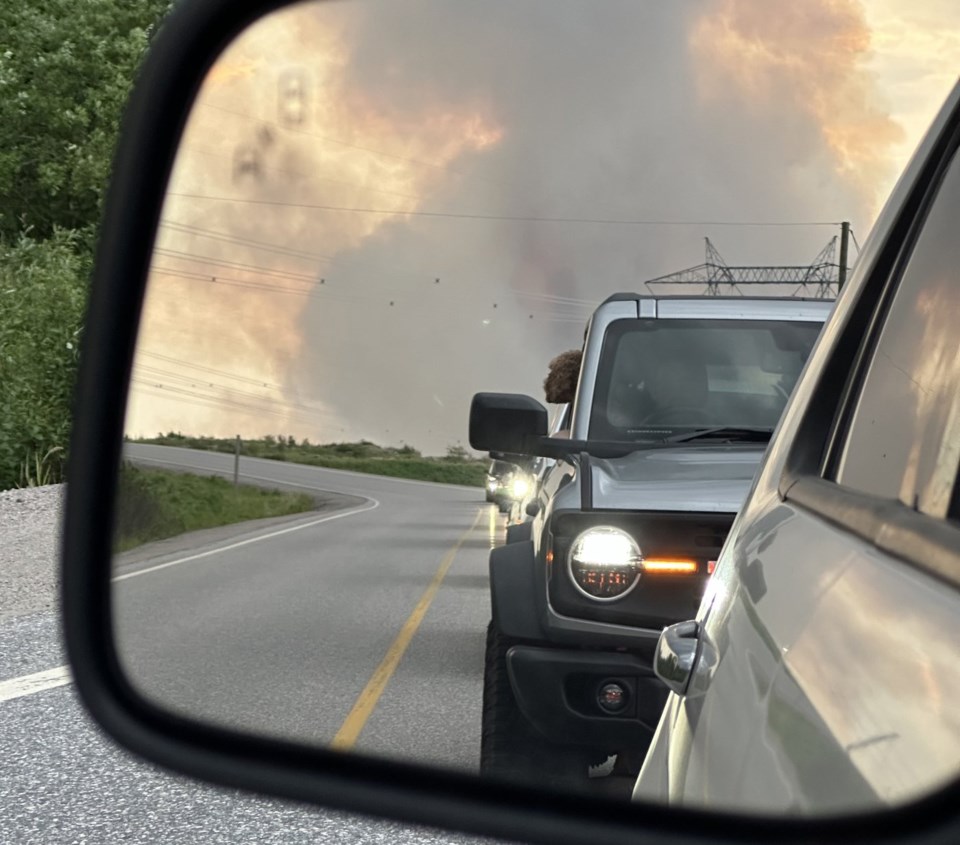ST. JOHN'S, N.L. — Water bombers from Quebec and Ontario will be helping to battle wildfires in Newfoundland and Labrador, bringing relief and hope to crews trying to keep a blaze near Churchill Falls from crossing a river and spreading to the town.
The four extra planes from the country's two biggest provinces doubled Newfoundland and Labrador's water bomber capacity, as the number of fires burning in the eastern region jumped to 11 on Friday, up from seven the day before.
"That's a significant increase for us," Mark Lawlor, provincial forest fire duty officer, said in an interview about the added water bombers. The bombers from Quebec arrived on Thursday, and those from Ontario arrived Friday afternoon and would join the fight the following day, he said.
With help from the four aircraft, crews will focus on preventing the fire nearest to Churchill Falls from growing, and keeping open the Trans-Labrador Highway, which connects the community to Labrador City in the west and to Happy Valley Goose Bay in the east, Lawlor said.
The fire nearest Churchill Falls has been burning since June 13, but the winds shifted suddenly on Wednesday evening, and the blaze rose up to quickly devour trees and advance toward the town by two kilometres in just 45 minutes. Officials sent out an emergency alert ordering everyone in the town to pack up and get out in less than an hour.
The community is home to approximately 700 people, as well as a hydroelectric generating station that provides power to Newfoundland and Labrador and Quebec. A skeleton team remains at the site to keep it working, and the plant is running at normal capacity, Newfoundland and Labrador Hydro has said.
However, the company said in a release Friday that smoke could damage parts of the plant's transmission lines, "resulting in trips."
"Team(s) are working to understand potential scenarios and mitigate any potential customer impact, should smoke conditions result in a trip," the release said.
Earlier on Wednesday, the province's wildfire dashboard showed that the fire covered an area of about seven square kilometres, and it was burning roughly 15 kilometres southwest of the town. By Thursday afternoon, officials said its size had more than doubled to about 16 square kilometres, and its flames were just six kilometres away from the community.
The Churchill River lies between the fire and the town, and fire officials are hoping the wind keeps it that way.
Lawlor said crews are also working to beat back another wildfire nearby that crossed the Trans-Labrador Highway about 17 kilometres west of Churchill Falls earlier this week. The remote two-lane highway cuts across Labrador's vast, wooded interior, and is the only road connecting communities in the west with the rest of the province.
More than 500 residents and workers forced to evacuate Churchill Falls on Wednesday drove east along the highway for three hours during a lightning storm to reach Happy Valley-Goose Bay, where they checked in with a local command centre offering cots and emergency supplies.
By Thursday evening, everyone had a place to stay and nobody needed the cots anymore, officials in Happy Valley-Goose Bay said in a news release.
Bonnie Learning, vice-president of the local SPCA board, said she and her team were set up at the YMCA Wednesday night until 1:30 a.m. They managed to find foster homes for 13 cats and two dogs that came with families forced to flee Churchill Falls, she said. By Friday morning, most of those families had come to retrieve their pets because friends, family or even total strangers had offered them and their furry friends a temporary home.
"Geographically Labrador is a large area, but when it comes to emergency situations, the communities really pull together," Learning said in an interview Friday. "I think it's just that small-town mentality that if someone needs a hand, you lend a hand if you can."
Officials said Friday it was still too soon to say when people might be able to return to their homes in Churchill Falls. In the meantime, Learning said Happy Valley-Goose Bay was bustling with more than 500 extra people in town.
"Lineups at (Tim Hortons) are longer," she said, laughing. "Everyone seems to be settled away here for the time being until they get word about what's going on in Churchill Falls, and when they can go back home. But generally speaking, everything's been really positive."
This report by The Canadian Press was first published June 21, 2024.
Sarah Smellie, The Canadian Press



